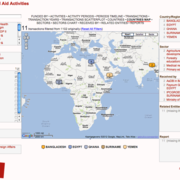
photo: Pat Pilon, via flickr, CC-BY-20
When I came across Twitter, years ago, it first looked like another chat service. But with the ability to interact via SMS, and easy ways to feed tweets into websites and applications, it quickly became a rich ecosystem for exchanging all kinds of status updates. You see metro lines on twitter, announcing disruptions in services.
It seems the days of the free ecosystem are over, and Twitter is joining the Closed Silos Club to monetise my social connections.
Twitter was a platform that was very open for messages coming in and going out through dozens, even hundreds of applications. Together with similar services like Jaiku, and open source versions like identi.ca (Status.net), it looked like the beginning of federated social networks, at least for such status streams.
It could be something like email, or chat via Jabber or IRC: you can communicate with others, regardless of whether you use the same service (Gmail, Hotmail, your own) or tools (Thunderbird, Outlook). And you could contribute to the common infrastructure by setting up your own server.
This ability to contribute to the infrastructure is what is key to the success of the internet. In peer-to-peer applications, this even is made so easy that most people don’t even realise they are contributing: BitTorrent, Skype, Spotify, the key to success is that not everything has to go through a central entity.
But over the last months, Twitter has started to focus on “ delivering a consistent Twitter experience “.
What that means is that I loose. One by one, the connections I made between websites and tools will be terminated.
Instead of being the source, it is turning into the sink of status updates on my networked profiles, a place where I dump updates made on other platforms, and where I will (for how long?) mostly interact during conferences.
Twitter introduced “Cards” which look remarkably like Facebook or Google+ status updates. But I don’t need another Facebook-style destination (like another Google+ ghost town). What I liked about Twitter was the wide variety of ways to interact. I don’t want a company-dictated “consistent Twitter experience”, I want to interact around status updates.
As a content publisher, I don’t need yet another social graph and more markup language. Or a provider who insists on monitoring everything I and my visitors do.
Apparently, the new terms for the API say:
“Don’t resyndicate data. If your service consumes Twitter data, don’t take that data and expose it via an API, post it to other cloud services, and so on.”
As if Google would forbid me to forward an email in my Gmail account with anything other than their web client.
My tweets were free, now they have to live in a cage…



 Earlier this year, I was approached by Michiel Kuijper, who was working on his Bachelor degree at the
Earlier this year, I was approached by Michiel Kuijper, who was working on his Bachelor degree at the